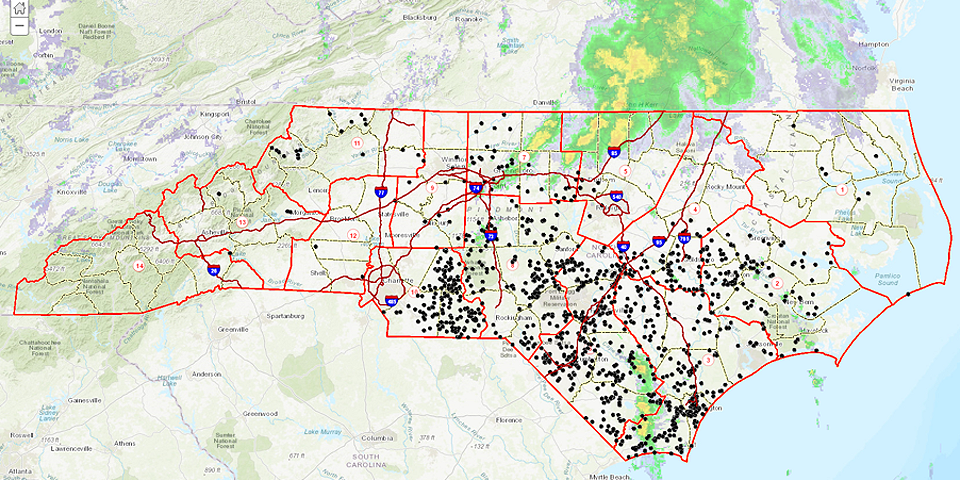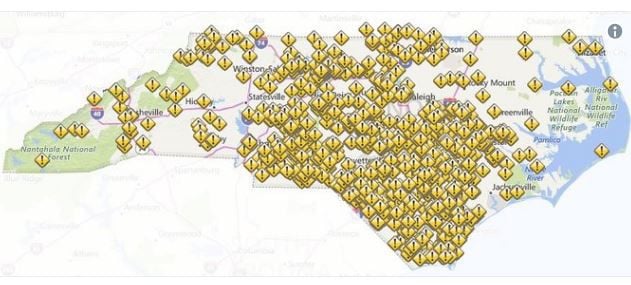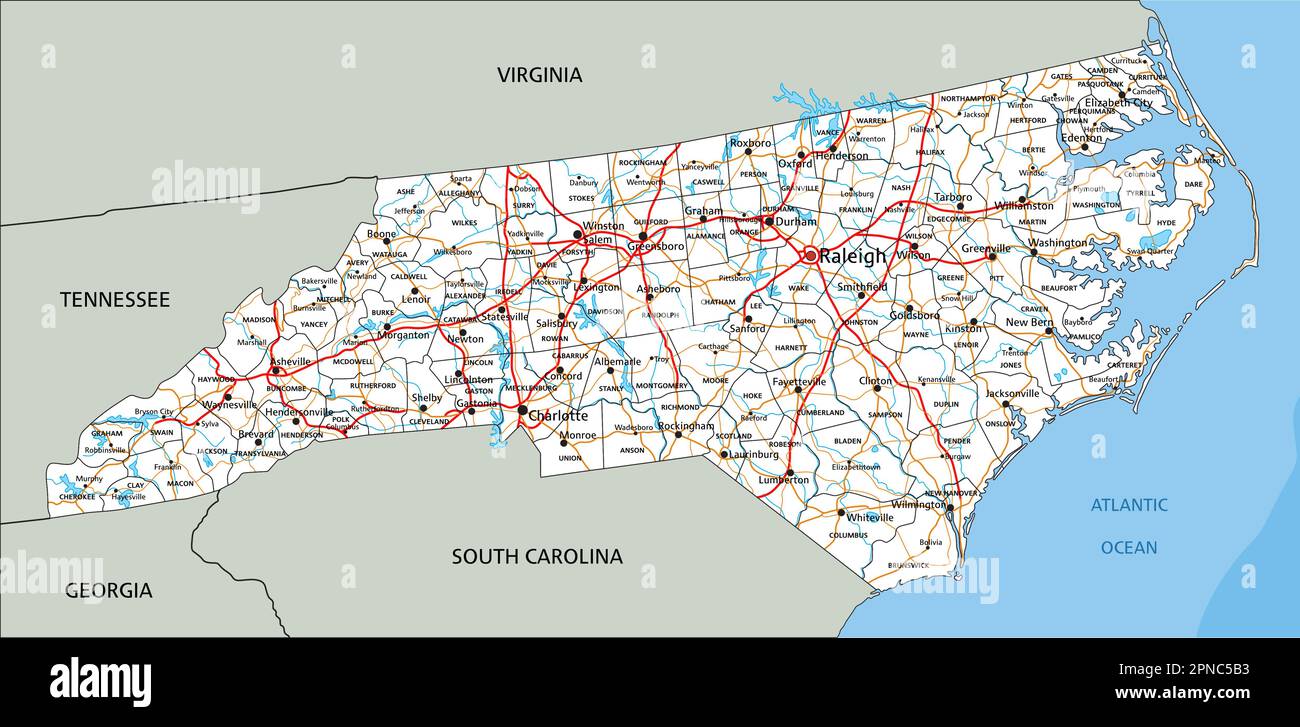Navigating North Carolina’s Roads: Understanding Road Closures and Staying Safe
Related Articles: Navigating North Carolina’s Roads: Understanding Road Closures and Staying Safe
Introduction
With enthusiasm, let’s navigate through the intriguing topic related to Navigating North Carolina’s Roads: Understanding Road Closures and Staying Safe. Let’s weave interesting information and offer fresh perspectives to the readers.
Table of Content
Navigating North Carolina’s Roads: Understanding Road Closures and Staying Safe

North Carolina, with its diverse landscapes and bustling cities, offers an array of travel opportunities. However, navigating its extensive road network can be challenging, especially during unforeseen events like weather emergencies, construction projects, or accidents. To ensure safe and efficient travel, staying informed about road closures is crucial. This comprehensive guide explores the importance of road closure information, delves into the various resources available to access this data, and offers practical tips for navigating road closures effectively.
Understanding the Importance of Road Closure Information
Road closures, whether temporary or long-term, can significantly impact travel plans. They can disrupt commutes, delay deliveries, and even pose safety risks. Understanding the reasons behind road closures and accessing accurate information about their location and duration is paramount for:
- Safety: Road closures are often implemented to protect travelers from hazardous conditions, such as flooding, landslides, or construction zones. Accessing accurate closure information allows drivers to avoid these areas, minimizing the risk of accidents or injuries.
- Efficient Travel Planning: Knowing about road closures enables travelers to plan alternative routes, avoiding delays and frustration. This is particularly important for long-distance trips, where even a minor detour can significantly impact travel time.
- Emergency Response: During natural disasters or emergencies, road closures can be essential for emergency responders to reach affected areas. Timely and accurate information on road closures allows emergency services to prioritize their efforts and optimize response times.
Accessing Real-Time Road Closure Information
Fortunately, various resources provide real-time updates on road closures in North Carolina, ensuring travelers have access to the latest information:
1. North Carolina Department of Transportation (NCDOT) Website and Mobile App:
The NCDOT website and mobile app are the primary sources for official road closure information. They offer a comprehensive overview of closures across the state, including:
- Interactive Map: This map displays current road closures in real-time, with detailed information on affected roads, reasons for closure, and estimated reopening times.
- Traffic Cameras: The website features live traffic cameras at various locations throughout the state, providing visual insights into traffic conditions and potential road closures.
- Road Conditions Report: This report provides a detailed overview of road conditions, including closures, construction, and weather-related issues, across the state.
2. Social Media Platforms:
Many official state agencies and local authorities use social media platforms like Twitter and Facebook to disseminate road closure information. These platforms offer quick updates and are often used to alert travelers about sudden closures or changes in road conditions.
3. News Outlets:
Local news outlets, both online and on television, often report on significant road closures, providing context and updates on their impact. These reports can be particularly helpful for understanding the broader picture of closures and their potential impact on travel plans.
4. Navigation Apps:
Popular navigation apps like Google Maps and Waze utilize real-time data, including road closures, to optimize routes and provide alternative paths. They also offer alerts on potential closures and traffic delays, helping travelers avoid congested areas.
5. Radio and Television Broadcasts:
Local radio and television stations often broadcast traffic updates, including information on road closures. These broadcasts are particularly useful for staying informed about closures in specific areas or during severe weather events.
Tips for Navigating Road Closures Effectively
Once you have access to road closure information, consider these practical tips for navigating closures safely and efficiently:
- Plan Ahead: Before embarking on any journey, check road closure information for your intended route. This allows you to anticipate potential delays and plan alternative routes if necessary.
- Check for Updates: Road conditions can change rapidly, so it’s essential to check for updates frequently, especially during severe weather or construction periods.
- Be Aware of Signs: Pay close attention to road signs, as they provide vital information about closures, detours, and potential hazards.
- Use Navigation Apps: Navigation apps can help you avoid closed roads and find alternative routes, saving time and effort.
- Be Patient: Road closures can cause delays, so be patient and avoid aggressive driving. Remember, safety is paramount.
- Stay Informed: Keep your phone charged and have access to reliable sources of information, such as the NCDOT website or mobile app, during your travels.
FAQs about Road Closures in North Carolina
1. What are the most common reasons for road closures in North Carolina?
Road closures in North Carolina are typically caused by:
- Weather Events: Severe storms, hurricanes, flooding, and snow can damage roads, making them impassable.
- Construction Projects: Road construction projects often involve lane closures or full closures, impacting traffic flow.
- Accidents: Accidents can cause significant disruptions, leading to road closures for safety and investigation purposes.
- Emergency Situations: Evacuations, power outages, or other emergencies may necessitate road closures for public safety.
2. How can I find out if a specific road is closed?
You can find information about road closures by:
- Using the NCDOT website or mobile app: The interactive map allows you to search for specific roads and view their closure status.
- Checking navigation apps: Apps like Google Maps and Waze provide real-time information on road closures, including potential detours.
- Contacting local authorities: Contacting the local police or highway patrol can provide specific information about closures in your area.
3. How long do road closures typically last?
The duration of road closures can vary significantly depending on the reason for the closure.
- Weather-related closures: These closures can last from a few hours to several days, depending on the severity of the weather event.
- Construction projects: Construction closures can last for weeks, months, or even years, depending on the scope of the project.
- Accident-related closures: These closures are typically temporary, lasting until the accident scene is cleared and the road is safe for travel.
4. What should I do if I encounter a road closure?
If you encounter a road closure, follow these steps:
- Stay Calm: Don’t panic. Road closures are common, and there are usually alternative routes available.
- Check for Signs: Pay close attention to road signs, as they provide information about the closure and potential detours.
- Use Navigation Apps: Navigation apps can help you find alternative routes and avoid congested areas.
- Be Patient: Road closures can cause delays, so be patient and avoid aggressive driving. Remember, safety is paramount.
Conclusion
Staying informed about road closures in North Carolina is essential for safe and efficient travel. By utilizing the resources available, including the NCDOT website and mobile app, social media, and navigation apps, travelers can access real-time information and plan their journeys accordingly. Understanding the reasons behind road closures and practicing safe driving habits during these situations is crucial for protecting yourself and others on the road. By staying informed and prepared, you can navigate North Carolina’s roads with confidence and enjoy your journey.



Closure
Thus, we hope this article has provided valuable insights into Navigating North Carolina’s Roads: Understanding Road Closures and Staying Safe. We appreciate your attention to our article. See you in our next article!